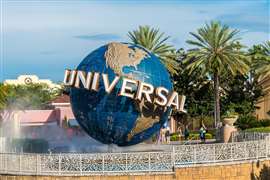Rollercoaster ride: Contractors rush to cash in on theme park construction spree
02 August 2024
Major US film and entertainment companies like Disney and Universal are hoping that construction sprees at new and existing theme parks can boost business. Lucy Barnard looks at the contractors who stand to benefit.
The village of Kempston Hardwick near Bedford in the UK has little to recommend it to the casual tourist. Once the site of the largest brickworks in the world, since the factory finally closed in 2008, the area is mainly known for its supermarket distribution centre and its railway station which has the dubious distinction of being one of the least busy on the network.
But all that could be about to change if plans by film giant Universal to build Europe’s largest theme park, including a 500-room hotel on the site, go ahead.
 The Universal Studios globe. Photo: Adobe Stock
The Universal Studios globe. Photo: Adobe Stock
According to Universal Destinations & Experiences, the owner of the Universal Studios franchise, which acquired the 476-acre site, with an option to buy a further 60 acres in 2023, the new park would be built along similar lines to its existing Universal Studios parks in Florida, USA; Osaka, Japan; Beijing, China; and Singapore.
“A world class theme park and resort from Universal has the potential to generate billions in economic benefit,” announced Page Thompson, Universal’s president for new ventures, “creating thousands of high-quality jobs and attracting millions of new visitors.”
Thompson is not mistaken. Theme park construction is big business for many construction companies around the world at the moment - both general contractors and specialists.
Over the past decade, big US entertainment companies, like Universal and Disney, have been opening new theme parks and expanding their existing offerings with only a brief pause during the pandemic. Part of the reason for this is the rise of internet streaming which continues to eat away at global cinema audiences, encouraging entertainment companies to look more closely at in-person experiences.
Why media companies are building more theme parks
In fact Universal’s three existing theme parks in the US have become so lucrative that film makers are being encouraged to design movie sets with the construction of future theme parks in mind.
Coupled with this are global demographic shifts especially in the Middle East and Asia, where theme park operators are benefitting from a rapid increase in the numbers of affluent consumers able to afford park entry and who they hope will also go on to watch their films and buy their merchandise.
Universal estimates that its UK project will generate a total of 20,000 construction jobs during its five- or six-year build, with around 5,000 workers on site at its peak.
 Beijing Universal Resort in China. Photo: Adobe Stock
Beijing Universal Resort in China. Photo: Adobe Stock
“Our aim is to employ as many local people as possible during construction so that our investment here further benefits local people and businesses,” Universal said in its April 2024 information pack. “Estimating how many workers may have to be sourced from further afield is complex and would also depend on the timescale of other infrastructure projects in the area.”
“Initial research suggests that shortages are more likely in specialist construction fields and civil engineering,” it added.
Further along in its development is Universal Epic Universe, a 700-acre resort, set to become the company’s fourth in Orlando, Florida, and which could become the largest theme park in the United States when it finally opens to the public next year after a covid delay.
According to local press reports, construction work on the project has been split into eight major parcels with contracts awarded to contractors including the Maryland-based Whiting Turner Contracting Company, Colorado-based Hensel Phelps, UK-based Balfour Beatty, California-based DPR Construction – and Florida based construction firms Finfrock Construction, Hubbard Construction Company, JR Davis Construction and Construct Two.
And further west, Universal Kids Resort in Frisco, Texas, a 97-acre, child-focused fun park set to open to the public in June 2026 which will include a 300-room hotel and what looks from artists renderings to be a Barbie-themed area, a replica Mexican village and a raft river ride. Balfour Beatty, the main contractor on the site, broke ground in December 2023.
At the same time, Universal Studios Beijing, a resort jointly owned by Universal and Beijing Tourism Group, in the city’s Wenjing subdistrict, is also set to expand. A first 400-acre phase of the resort opened in September 2021. Work on a second phase is slated to start before 2025. When the total 1,000-acre site is completed, it will be the largest Universal Studios resort in the world.
Disney to double theme parks division investment
And Universal is not the only one. In September 2023, Disney, the biggest theme park operator in the world, announced it planned to pour US$60 billion into its division which includes theme parks and cruises over the next decade – about double what it spent in the previous decade on its locations in California, Florida, Tokyo, Paris, Hong Kong and Shanghai.
In a blog post, the company said that it already owns more than 1,000 acres of land earmarked for possible future development on which it could expand – the equivalent of about seven new Disneyland parks.
Balfour Beatty has been already working on replacing Disney’s famous log flume ride, Splash Mountain, at Disneyland, California and Magic kingdom, Florida, with a new experience based on Tiana’s Bayou Adventure. The contractor has previously worked on Pandora – the World of Avatar at Disney’s Animal Kingdom and Remy’s Ratatouille Adventure at Epcot.
 George and Peppa Pig pose for photographers at a preview of Peppa Pig Theme Park in Florida in February. Photo: Reuters
George and Peppa Pig pose for photographers at a preview of Peppa Pig Theme Park in Florida in February. Photo: Reuters
Moreover, it seems as though more overseas expansion could be on the cards for Disney. According to the company’s own research, globally around 700 million people have what it calls “a high Disney affinity” but do not visit Disney parks – providing “an enormous untapped potential for reaching more consumers.”
“We are planning to turbocharge our growth yet again with a robust amount of strategic investment in this business,” said Disney chief executive Bob Iger.
Merlin Entertainments, the world’s second-biggest theme park company, which operates a string of attractions including the Legoland franchise, Madame Tussauds and Peppa Pig theme parks, is also building.
In 2022, the company opened its first Peppa Pig theme park in Winter Haven, central Florida on 5.5 acres of land next to its existing Legoland Florida resort with Detroit-based Barton Mallow leading the design-build construction. In July 2023, the company broke ground on another 14-acre park in the North Richland Hills, Texas with Alabama-based Hoar Construction. And in May 2024, the company opened Europe’s first Peppa Pig theme park in Günzburg, Germany, next to its Legoland Deutschland.
Peppa Pig parks in the USA and Germany
In China, where Merlin operates through joint venture partners with local owners, Merlin is expanding rapidly. The company’s Legoland Shanghai resort is scheduled to open next year where contractor Shanghai Jinshan Urban Construction Investment Group reported in February that construction had reached its halfway point. Legoland resorts are also under construction in Shenzhen, Sichuan and the Fangshan district of Beijing, all three are reportedly being built by China State Construction.
And it’s not just films and toys which are proving popular themes for new megaparks around the world. Many entertainment companies are opting to license intellectual property to local developers in exchange for a cut. Earlier this year, the world’s first theme park dedicated to Spanish football (soccer) team Real Madrid, Real Madrid World, opened within the Dubai Parks & Resorts complex between Abu Dhabi and Dubai. It joins a bewildering array of themed attractions to have opened in the region including Ferrari World, Warner Bros World and a part-Marvel-themed IMG Worlds of Adventure.
More ambitious still – and also currently under construction - is the Saudi Arabian Public Investment Fund’s plans for a cluster of massive theme parks in its Qiddiya new town located around 45 kilometers southwest of the Saudi capital Riyadh.
 Image: Qiddiya Investment Company
Image: Qiddiya Investment Company
The Qiddiya megaproject, which in total measures 366 square kilometers – roughly half the size of Singapore – bills itself as a city dedicated to play and, alongside a Formula One track, stadium, performing arts centre and golf courses, will include two major theme parks and a water park.
Construction work on the 79-acre Six Flags Qiddiya park began at the end of 2021 after the Qiddiya Investment Company awarded a US$1 billion contract to build it to Bouygues subsidiary Bouygues Bâtiment International and Saudi firm Almabani General Contractors. The park is set to include 28 rides and attractions including the longest, tallest and fastest roller coaster in the world and is expected to open next year.
And in March 2024, Qiddiya announced that it would be adding a third theme park to the megaproject, a 500,000 square meter park based around the Japanese manga series Dragon Ball. The park will include more than 30 rides including a 70-meter-high dragon called Shenron containing a rollercoaster.
Yet, due to the billions of dollars often required to build and maintain them, many proposed parks are never built - or worse still for contractors stall soon after construction work starts. Universal alone has abandoned projects in Russia, the UAE, South Korea and Germany.
Eighty miles down the M1 motorway from Kempston Hardwick is the village of Swanscombe in Kent, which in 2012 was announced as the location of a proposed 1,000 acre London Paramount Entertainment Resort and which British newspapers excitedly dubbed “British Disneyland.” Despite being spearheaded by former Millennium Dome boss PY Gerbeau and receiving backing from the wealthy Kuwaiti Al Humaidi family, the project was finally withdrawn in 2022, in part, due to the discovery of a rare breed of jumping spider on the site.
STAY CONNECTED



Receive the information you need when you need it through our world-leading magazines, newsletters and daily briefings.
CONNECT WITH THE TEAM








